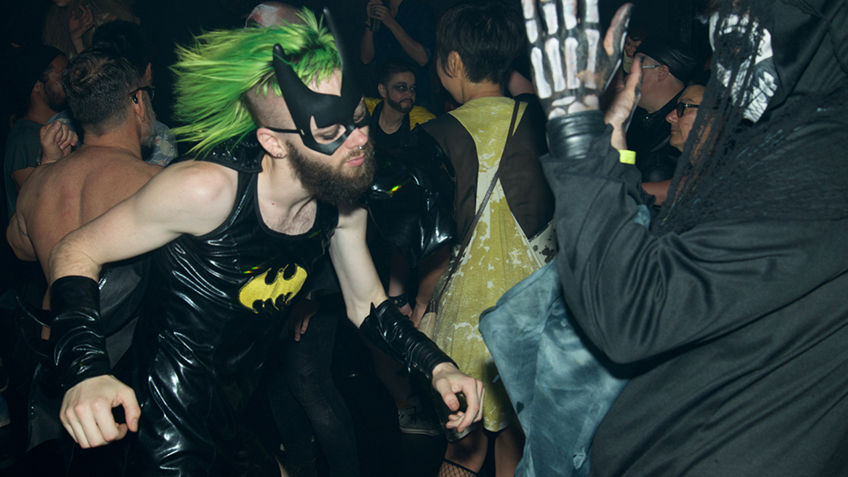– During the Sydney Olympics, I was living in Dharawal country on the South Coast. The Central Desert women who’d danced in the Opening Ceremony were staying there. A barbecue was organised with us locals. We hadn’t expected the women to dance that day but suddenly, after lunch, the lawn was cleared. The women rose and began to sing and dance with clapsticks. We sat on the ground, feeling the harmonic drone of their voices, the swish of eucalyptus, the thumping of feet. Sitting that close to that many people dancing barefoot on the ground — and they hit it so deliberately with the whole sole — the song seems to rise out of the earth, vibrating through your body, into your marrow.
– When I lived in Paris in the 80s, I went to a lot of African concerts. The diaspora was huge. They lived under duress. Police raided buildings in the dead of night, hauling out entire families for deportation. I remember one concert on the outskirts. We’d gone to see the headliner, a drummer from Senegal. But the most popular act turned out to be the griots – oral storytellers. As soon as they came on, the audience rose to their feet shouting and swaying. We had no idea what they were saying, but the exultation rained down on us like a blessing.
– In the early 90s, I went to a Mardi Gras party. I was newly queer and had moved to Melbourne to escape my big Catholic family. I’d been to plenty of parties but returning to Sydney to attend this one changed something in me. A woman took me upstairs to a viewing room. We stood at the window watching thousands of semi-naked folk dancing below. The crowd pulsed and flowed like an ocean, the occasional headdress or raised hand breaking through like whitecaps. People talk about queer family but what I saw was an ecosystem. A habitat. And I thought, I can live here.
– In Poland, we stopped in a village called Kazimierz Dolny for a Folk Music Festival. A klezmer band was playing at a cafe, people calling out requests between mouthfuls. On the main stage was a Ukrainian women’s choir. Bands set up in doorways, fiddlers sang alone. As night fell, the village square was heaving: couples whirled arm-in-arm, drunks reeled, conga lines formed. Kazimierz Dolny was once home to 3000 Jews, all killed. As I danced I thought of Jacob, from Isaac Bashevis Singer’s novel The Slave, set in the 17th century. Jacob returns home after a massacre in which his wife and children were killed. The graves were not marked, and he finds it impossible to come to terms with. At a wedding, a jester sings to him, ‘What is life, but a dance across graves?’
– In November 1999, a Sex and Subculture party took place on federal election day. As we arrived around midnight, the results were called. John Howard’s second term began. On stage, a cage was winched down, releasing a mummified figure. Slowly he was unwrapped. Naked, he spun around, revealing stitched lips and a swastika sewn into his chest. He tore out the stitches, screaming. Blood poured from his face, down his body, and all the rage and pain in the room sucked into that moment, like gas to a flame. We cheered and stamped, then danced all night, in a fury.
– In Mexico City, I fell ill. Wanting some peace and quiet, I went down to Oaxaca, timing my arrival for a Monday. After checking in, I went for a walk. Through the narrow streets, music beckoned and I soon found myself in the Zócalo. In front of the cathedral, was a sixteen piece marimba band in full swing. People of all ages were dancing, some dressed up, others scruffy. Still weak, I watched their feet, each couple doing a different set of steps, all somehow in unison, burning up the pavement to the fiery salsa.
– I usually avoid ANZAC Day but last weekend in Redfern Park, I stumbled across scores of Maori rehearsing a haka. Flanking the path, two lines of women then two of men, dressed in black, some in grass capes and moko. (While they waited, their teacher walked among them, encouraging: Don’t worry about what people think, get out of your heads, do the moves as you feel. Knowing what you’ve been through, what it took for you to get here today, we are thankful.) An Aboriginal dancer did a smoking through the crowd. Then a cry went up and the parade began, headed by Maori warriors, painted up, dancing with weapons. Indigenous Servicepeople filed past, some very old. And all along the path the chanting of 100 people rose – Te Waka – and the slapping of thighs and chests, the stomping of feet.
– In Sydney, dancing was illegal for almost a year. Already, the Lockout Laws had closed so many venues. Finally at Easter, the ban was lifted. We got our party tickets, organised our outfits. We walked down the stairs, into the pounding beat. I hugged friends I hadn’t seen for over a year. By midnight, the sweat was flowing. Buttons were undone, shirts came off. Everybody was on the dancefloor. I kissed my lover. I thought of my friends in Mexico and Paris. I felt grateful. I was restored. When we went out for a smoke, we saw a new club had opened next door. A young crowd, half of them African, were lining up, waiting their turn to get inside and dance.
Eight Scenes was delivered at the Gala Event of Sydney Writers Festival 2021, Within Reach.
Written by Fiona Kelly McGregor.
